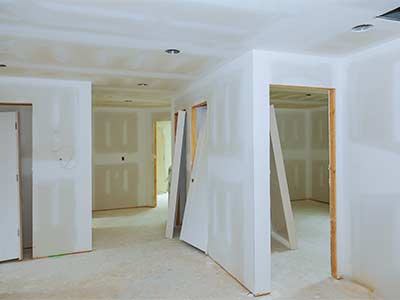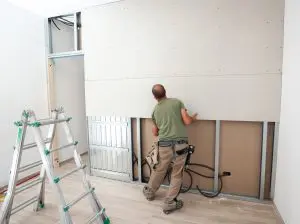
The skilled professionals who install drywall in homes or other buildings are known as drywall framers. A variety of tasks are required for a drywall installer, such as measuring and cutting drywall or preparing a smooth surface to paint. A drywall contractor is responsible for fixing and hanging drywall, as well as installing light fixtures and other light-related tasks.
There are a number of ways to become a drywall installer, including attending a vocational school, entering an apprenticeship program, or specializing in different types of drywall. It doesn't matter which path you choose, your contribution will be significant in improving the lives of people.
Drywall installation demands a lot of focus, flexibility, and attention. Installers often stand for long periods of standing, whether they are working outdoors or indoors. They may have to lift large materials or use specialized equipment. Some installers also have to handle asbestos.

Although a degree is not required to become a drywall installer, it can help. It gives you the knowledge and skills necessary to be a drywall installer. Also, many employers prefer a degree. The result is that a drywall installer can go up in the ranks after having gained enough experience.
Many of the jobs in the construction industry have become more and more specialized. A drywall installation worker may be required to lift and conceal heavy drywall panels. The drywall installer will need to measure and cut the drywall to fit into the wall's frame. A wall installer should have great physical stamina.
The typical drywall installer works 40 hours per week. They are permitted to work extra during weekends and busy periods. Before they can enter the United States, drywall contractors must pass an I-9 immigration document verification exam.
The ideal person for a career as a drywall installer should possess strong moral and ethical values. You should be able communicate with clients as well as coworkers. A drywall installer should also know how solve problems as this job is often physically demanding.

If you're interested in this career, you can earn great pay. Construction workers are needed to work in the construction industry. Although there is an increasing need for craftspeople in many areas, there is still a shortage. This is a great situation because it means skilled craftspeople have plenty of work.
Trades careers offer many benefits, not only the high pay but also a wide range of other benefits. For example, many people love to work outdoors. Moreover, there is no student debt involved, which can allow someone to start earning money sooner. The best part is that the construction industry is merit-based. This means there are many opportunities to move up in the industry. You will have the opportunity to learn new skills and contribute to the improvement of your community, whether you are a drywall installer, a plasterer, roofing contractor or a plasterer.
FAQ
Is it better for a contractor to hire or a subcontractor to do the job?
A general contractor will usually cost more than a subcontractor. A general contractor often has many workers, which means they can charge their clients more for labor. Subcontractors, on the contrary, hire one employee and charge less per hour.
What can I do to save money on my home's renovation?
It is possible to save money by doing the work yourself. Reduce the number and frequency of people you hire for the renovation. You might also look for ways to decrease the cost and use of materials in the renovation.
You can live in a house while it is being renovated.
Yes, I can live inside a house while I renovate it.
Is it possible to live in a house with renovations going on? It depends on the length of the construction. If the renovation lasts less then two months, then it is possible to live in your home while it is being constructed. If the renovation takes longer than two weeks, however, you can't live in your home during the construction.
Because of the possibility of falling objects, you shouldn't live in your home while a major construction project is underway. You could also suffer from noise pollution and dust caused by the heavy machinery used on the job site.
This is especially true for multi-story houses. In this case, the sound and vibration created by the construction workers might cause severe damage to your property and its contents.
As I mentioned before, while your home is being remodeled, you'll have to manage the inconveniences of living in temporary shelters. This means you won’t have the same amenities as your own home.
As an example, your washer and dryer will be out of commission while they are being repaired. The workers will make loud banging noises, paint fumes, and chemicals obstruct your ability to use your dryer and washing machine.
These factors can cause stress and anxiety in you and your family. You should plan ahead to avoid feeling overwhelmed by this situation.
When you decide to start renovating your home, it is best to do some research first so that you can avoid making costly mistakes along the way.
A reputable contractor can also be of assistance to you in order to make sure everything runs smoothly.
How many times should my furnace filter need to be changed?
The answer depends on how often you expect your family to use your home heating system. Consider changing your filter frequently if your family plans to leave the house during cold weather months. But if you do not often go outside, it may be possible to wait longer between changing your filter.
A furnace filter can last about three months. This means that your furnace filters should be changed every three to four months.
Check the manufacturer's guidelines for when you should change your filter. Some manufacturers suggest changing your filter every heating season. Others recommend waiting until you see dirt buildup.
How can you remodel a house without spending any money?
These are the steps to follow when renovating your house without spending a lot of money.
-
Make a budget plan
-
Find out the materials you require
-
You must decide where to place them
-
Make a list with the items you need to purchase
-
Determine how much money you have
-
Plan your renovation project
-
Get to work on your plans
-
Online research is a good idea.
-
Ask friends and family for help
-
Get creative!
Statistics
- Rather, allot 10% to 15% for a contingency fund to pay for unexpected construction issues. (kiplinger.com)
- Design-builders may ask for a down payment of up to 25% or 33% of the job cost, says the NARI. (kiplinger.com)
- Most lenders will lend you up to 75% or 80% of the appraised value of your home, but some will go higher. (kiplinger.com)
- On jumbo loans of more than $636,150, you'll be able to borrow up to 80% of the home's completed value. (kiplinger.com)
- They'll usually lend up to 90% of your home's "as-completed" value, but no more than $424,100 in most locales or $636,150 in high-cost areas. (kiplinger.com)
External Links
How To
5 Things You MUST Know Before Starting Your Home Renovation
-
Are you sure that this is something you want to do? - If you're going to start a major home improvement project like renovating your kitchen, bathroom or even building a new house, there's no doubt that you'll need some help along the way. It's possible to feel overwhelmed by such a large project. This could cost you a lot of money and time, and you may not get any real benefit from it. Instead, you can hire someone who knows their stuff to help. You'll be able to save a lot of time and stress while still having a lovely space to call your own.
-
How much should a project cost? This may seem obvious but it could make things worse if you spend too much on your renovation project. This is because most of the cost will be recouped at the end. Keep your budget in mind. If you don't, you might end up spending a lot of money and not receiving anything.
-
Do I prefer to hire professionals or DIY? - There's no right or wrong answer here, but we'd recommend hiring professional tradespeople if you can afford them. They'll give you the best advice possible on how to proceed with your particular project. They will install the plumbing correctly, take care of safety, and offer a guarantee after they have finished their work. DIY projects often involve a lot trial and error. You'll learn a lot the hard way. There will be many problems along the way.
-
Can I afford it? Do not underestimate the costs of a renovation. You might need to borrow money from family and friends to pay the bills. It is also important to consider the selling price of your current property when you plan on selling it soon after you have completed the renovations.
-
What is the best place to start? There is no wrong or right place to start when it comes time to choose where to begin. However, we would suggest that you choose somewhere that you enjoy working on. You'll feel more motivated to work and less likely to procrastinate. Also, avoid places that are difficult to maintain. You should avoid redecorating your living room if it is always covered in dirt and dust.